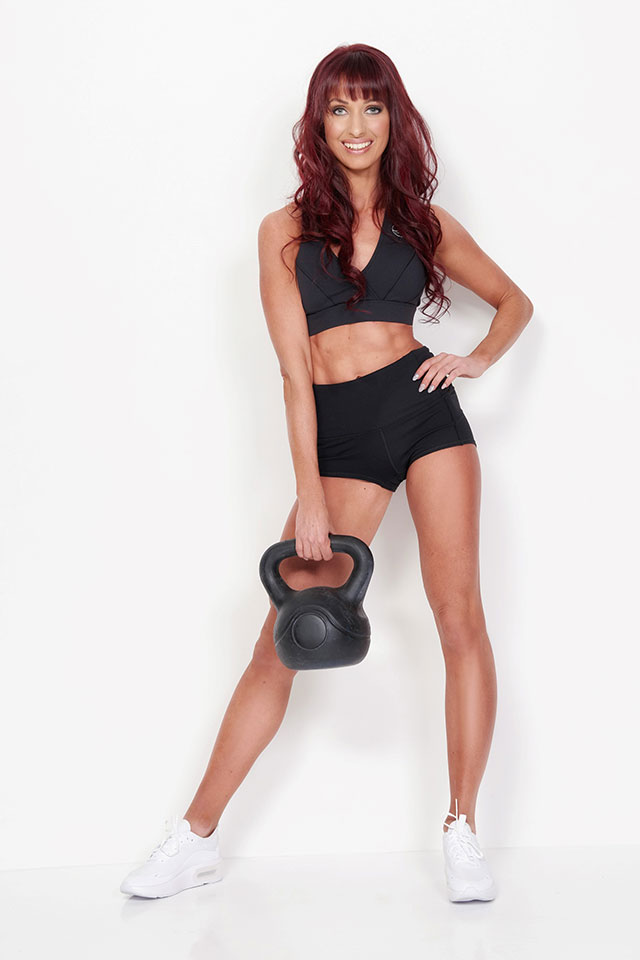Emily Goodenough is a 27-year-old diagnosed with Ankylosing spondylitis (AS ank spond) three years ago.
She is a personal trainer and a life coach. “I believe that you have a choice – look at arthritis as a ‘disability’ or use it to make you stronger. Allow it to motivate you to achieve your goals in spite of it”.
For Emily, keeping active is essential and is a massive part of her lifestyle. “Having ank spond pushes me to exercise even on the difficult days. I know that moving will make it better. I also changed my diet two years ago and now eat only clean, unprocessed foods. My new diet allows me to take less than half of the medication that I used to, as well as having a positive effect on my confidence”.
Emily understands it’s essential to listen to her body, but won’t let AS get the best of her. “As a fitness coach, I help my clients overcome the barriers that life puts in the way, like arthritis, and help them take it as a positive”.

Emily thrives on setting herself new goals. In August she participated in an NZIFBB (bodybuilding) competition, taking home 1st place in Bikini Novice Tall, and 2nd place in Bikini Open Tall category.
Emily wants to make a difference and help those who are struggling with arthritis, especially those who are diagnosed with this “old person’s disease” at a young age. It can be challenging to accept and can come as a shock as most people aren’t aware that it affects anybody at any age.
“I offer online personal training (specialising in women’s fat loss and toning) and wellness coaching. A personal trainer focuses on fitness programming while a wellness coach looks at the bigger picture of a client’s well-being by taking their nutrition, stress levels, lifestyle, habits and beliefs into account.”
By combining these two services, Emily enjoys helping people feel empowered, confident and motivated to achieve their health and fitness goals. Visit the Ignited Training website for more information.
What is Ankylosing Spondylitis?
Ankylosing spondylitis is a form of inflammatory arthritis that affects the spine and joints of the lower back. Symptoms include chronic back pain and stiffness. In severe cases, the affected joints in the spine may become fused and inflexible. There may also be deformity or curving of the spine.
The condition can occur at any age but is most likely to develop between the ages of 13 and 35 years and is uncommon after the age of 40. It affects men almost three times more often than women.
Genetic factors may cause AS. About half the risk is related to a gene called HLA-B27, although the gene is also present in healthy people who don’t have the condition. Genetic links between AS and Crohn’s disease or inflammation of the bowel exist too.
There is no cure, but treatment and effective self-management can minimise symptoms and prevent complications.
Cost of AS and other forms of arthritis
Medical costs for all forms of arthritis amounted to $1 billion in 2018. Of that, a third were in-hospital expenses (public and private). A staggering 48% of people with arthritis are of working age, people with families and responsibilities, people trying to make a life for themselves.
The findings in the recent Economic Cost of Arthritis in New Zealand report have significant implications for how the health system manages arthritis. Some key findings related to health care costs:
- Health sector costs associated with arthritis were estimated to be $992.5 million in 2018, equivalent to 23% of total financial costs.
- Of this, an estimated one third is attributable to hospital inpatient costs ($321.0 million). Public inpatient costs were expected to be $244.0 million, and private inpatient costs were estimated to be significantly lower, at $77.0 million.
- Residential aged cared costs related to arthritis were $97.9 million, while arthritis-related pathology and diagnostic imaging costs were $96.4 million, and pharmaceutical costs were $69.5 million.
Arthritis can affect anyone at any age, and new figures released in 2018 reveal that more than 670,000 people in New Zealand have a form of arthritis, 48% of which are of working age.

Have an Arthritis Educator phone you!
To save some time over the phone, fill out the online form and let an Arthritis Educator call you back at a time that’s convenient for you.